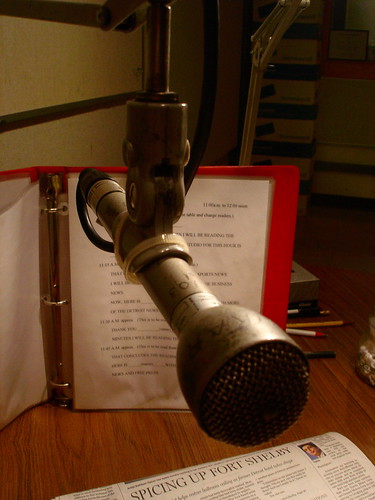Scott and I got into a fun little debate over Bogosian's Talk Radio last week. Since he has asked us to post a blog comparing the play and the film, I am copping out slightly by re-posting my most recent response to our conversation (which covers my thoughts on the comparison). The only thing I have to add that is not included below is that I think Eric Bogosian might actually secretly be Anthony Bourdain. Anyone else see the similarity?
Back to the matters at hand. Here is my latest rant. Feel free to join in...
I'm not arguing against talk radio as an institution for meaning-making. On that nice, academic scaffolding we can legitimize talk radio's existence. But I wouldn't make the argument that talk radio is journalism. Or, to be fair, not the talk radio featured in the play. Sounding off is not journalism. Sounding off is entertainment. Journalism holds those in power accountable. I'm not arguing that talk radio can't. I would argue that Bogosian's macho-rebellious cool cat is off on a personal philosophic journey. It has value, but it's not journalism.
Talk radio, as we know it today, has its own sordid history in the United States. Bogosian may have written the play in mid-1980s, but being just a young toddler myself in the grand decade of neon and new wave, all I can really hear is a Rush Limbaugh or a Sean Hannity. And though the rise of the right-wing conservative talk radio is often related to the repeal of the Fairness Doctrine, it was really the 1996 Telecommunications Act -- which repealed ownership limits on radio stations -- that turned the local downtown station into a repeater tower for the nationally syndicated ideology of the right-wing. Which returns me to the whole idea of gatekeeping and meaning-making. It was pretty easy for U.S. politics to turn to the right when talking heads who were cheaper to syndicate than paying for local reporters and investigative journalism.
After watching the film (and I presume that Bogosian oversaw screenplay and had his hand in direction as well) it just becomes more clear that this is about the one-man's libertarian journey for meaning and not about the institution itself.
And fun as it is, it sure ain't about journalism...


Candace, we essentially have different definitions of journalism. Mine appears to be a bit wider than yours.
ReplyDeleteNot that it is the ultimate source by any means, but I was interested in what the Wikipedia entry on journalism would be like.
http://en.wikipedia.org/wiki/Journalism
Interesting G. Stuart Adam took a stab at a definition in the pre-Internet era -- back in 1993. I like a lot of what he has to say, and I am curious how he would embrace the radical shifts going on today and try to explain them in the context of journalism.
http://www.poynter.org/media/product/20030123_141216_24094.pdf
You will be hard pressed to find someone who believes more in user generated content and breaking down the cultural gatekeepers who have dominated the media over the past century than me. I love the Internet, I love that the question of "WHO is a journalist" is in flux, and as a cultural studies major I am a big fan of critique and the important role that it plays in our society.
ReplyDeleteBut again, I just keep coming back to how this is framed. You're going to have to work a lot harder to explain to me how journalism is telling me that you do or don't like the French Fries at a restaurant or that Elvis Costello's "My Aim is True" is the best Costello ever.
I believe that there are gray areas. But I'm sorry, hearing how a hamburger makes you feel (or a garbage disposal, or your ex-wife) is not journalism. Neither is storytelling in and of itself. The Bible = not journalism.
I may seem picky, but definitions are important. When you look at the failure of journalism to ask the tough questions when we've needed them most (WMDs? WTF is up with Wall Street?) its easy to see why we are where we are today. And as smart folks from Columbia to Poynter to the Berkman Center take up the question of how to save journalism, I don't want to see that translate into how to best situate a newspaper to talk about whether the new Stephen King novel was scary.
Democracy is it stake. We can't keep screwing this up.